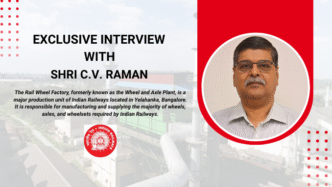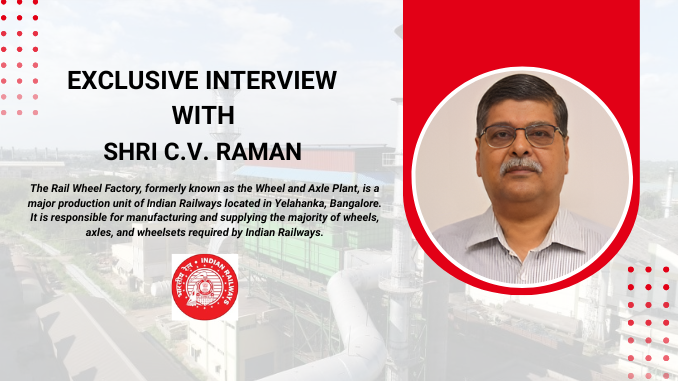Rail Analysis: Could you provide us with a brief overview of your experience with the Rail Wheel Factory’s history and its key achievements?
Shri C.V. Raman: RWF was set up in 1984 with a vision of making India self-reliant in terms of manufacture of Railway Wheels, Axles and Wheelsets. From a humble capacity of 56,700 cast Wheels, 23,000 forged Axles RWF has grown to produce 2,01,150 Wheels, 93,880 Axles, and 98,350 Wheelsets in FY 2024-25. The production figures for Wheels and Wheelsets are the highest in the history of RWF.
Another amazing achievement of this factory is that none of its components have failed in service over the past 40 years. The Plant also has the capacity of manufacturing Axles for Vande Bharat trainsets. We have also exported our Wheels and Axles through PSUs like RITES.

We have won the Factory of the Future 2022 award presented by Economic Times Edge and The Machinist Magazine, the Golden Peacock Eco-Innovation Award 2021 for environment management. We have been adjudged the Best Production Unit of Indian Railways for the Year 2023.
Rail Analysis: The introduction of the Piped Daylight System has been a notable development. How has this solar-powered lighting system affected energy consumption and working conditions within the factory?
Shri C.V. Raman: The piped daylight has been introduced on a pilot basis in Wheel manufacturing shop of RWF. The staff are happy with its performance. However, as a foundry, RWF has by the very nature of its operations, a high energy consumption and hence, further scaling of this lighting system is required to achieve significant savings.
Rail Analysis: RWF has implemented water conservation measures like well rejuvenation and sewage treatment. What outcomes have you seen so far, and what future plans are in place to strengthen water sustainability?
Shri C.V. Raman: RWF has implemented water conservation measures like rejuvenation of abandoned wells and treatment of sewage and other waste water generated by the Plant. These wells are recharged with storm water. RWF is able to tap this renewable resource to become almost self-sufficient in process water requirements.

Future Plans:
- Use of STP water for manufacturing: A pipeline has been provided from Colony STP to the Plant for use in production. This will reduce the consumption of fresh water to the extent of 40,000 litres/day. Installation of two New STPs is in the pipeline.This will enable RWF to utilise fresh water from wells for domestic purposes, which will reduce our dependence on municipal water supply.
- Optimal operation of Cooling Towers: Running the cooling tower fan at variable speeds according to ambient temperature will optimize evaporation resulting in saving of 5000 litres of cooling water per day.
- Optimization of Heat Exchangers: Replacement of tubular heat exchangers with plate-type heat exchangers will enable better heat transfer with savings of 4000 litres of water per day.
Rail Analysis: The Indian Railways has projected a significant increase in the demand for forged wheels, particularly with the introduction of high-speed trains. How is RWF preparing to meet this anticipated demand and reduced reliance on imports?
Shri C.V. Raman: RWF is manufacturing cast wheels through pressure pouring. Manufacturing of forged wheels involves a different process which RWF does not have at present. RWF’s purpose was to specialize in the manufacture of cost-efficient cast wheels which power the freight expansion of Indian Railways. RWF has ramped up its production of cast Wheels to over 2,00,000 Wheels per year, thereby contributing to “Mission 3000MT” of Indian Railways. RWF has also provided technical consultancy to its sister Plant at Bela enabling it to further improve production of cast Wheels for Indian Railways.
The joint efforts of both these Plants under the guidance of Railway Board has made sure that India remains Atmanirbhar in production of freight Wheels even though the demand is increasing substantially. RWF is also supporting high speed trains by manufacturing Vande Bharat Axles with blooms supplied by Indian vendors like M/s SAIL. In fact, during the Ukraine war, planned supplies from Ukraine for Vande Bharat Axles did not materialize. the The rakes under manufacturing by M/s Medha, Hyderabad could be turned out on time.
Rail Analysis: With Indian Railways’ focus on technological advancements, including hydrogen-powered trains and modern rolling stock, how is RWF aligning its manufacturing processes to support these innovations?
Shri C.V. Raman: The issue of modern rolling stock can be considered in two compartments – modernization of freight rakes and that of passenger rakes. A number of new designs of freight rakes are being developed by RDSO in coordination with the wagon building Industry to target various objectives like transport of specialized commodities (e.g. NMG car), higher speeds and higher pay loads.
All these designs use the existing BOXN and BLC Wheels and higher pay loads are managed by 25 T Axles quality of production. RWF’s critical machines have been supporting the increased containerization of Indian Railways by turning out much higher numbers of BLC 25 T of Wheelsets which are supplied to major players like M/s CONCOR. (16.33% during the year 2024-25, expected to increase to 43% in the current year). In case of passenger rakes, it has already been detailed that RWF is manufacturing Axles for entire family of Vande Bharat trains.
Rail Analysis: What technological innovations has RWF introduced in its wheel and axle production over the past five years?
Shri C.V. Raman: RWF is a unique production plant and many of the machines operated by RWF are unique to this Plant.Thus, ensuring a high level of productivity involves a deep understanding of these machines, their unique technology and a series of small and big innovations to maintain the reliability while improving Worker safety and quality of production. RWF’s critical machines like the Electric Arc Furnaces, the long forging machines, the heat treatment furnaces have an availability of more than 95%. This is possible due to the dedicated efforts of our team. Five indigenously designed scrap cutting machines which eliminate manual labour in processing of input scrap to the Electric Arc Furnaces are in operation.

A fume extraction system has been installed to reduce particulate matter and dust in the shop floor as well as surrounding areas. In spite of being a foundry, RWF has an average AQI of 70 which is much better than many urban Centres. A significant environmental impact in any foundry is the use of sand for casting.RWF has installed a thermal sand reclamation plant which enables re-use of foundry sand. This has reduced RWF’s annual procurement of sand by over 50%.

Rail Analysis: How does the management envision RWF’s contribution to the “Make in India” and “Atmanirbhar Bharat” initiatives?
Shri C.V. Raman: RWF is significantly contributing to Make-in-India & Atmanirbhar initiatives of Government of India by manufacturing and supplying Axles with high quality and reliability for all types of rolling stock to our Loco & Coach manufacturing units & Zonal Railways. We also supply Wheels & Wheelsets for freight stock to Zonal Railways as well as Wagon Builders. Vande Bharat Axles are also being regularly supplied to Indian Railways.

Rail Analysis: Anything else you would like to share with our readers?
Shri C.V. Raman: RWF is a unique plant of Indian Railways. The working culture of staff and their dedication is commendable. This has resulted in RWF surpassing production targets by Railway Board consistently. This has made Indian Railways almost self-reliant in production of Wheels, Axles and Wheelsets and contributed to the economic growth of the Country.

With in-campus KendriyaVidyalaya, Hospital, sports facilities and cultural institute, overall well-being of employees is ensured. The plant has a huge green cover including Miyawaki Forests and well-conserved wet lands.


Thus, the plant is committed to inclusive economic growth with creation of jobs, environmental protection and provision of safe working condition for betterment of all employees and their families.
Images Credit: Rail Wheel Factory
This Interview is a part of our latest Magazine: Subscribe to our Magazine Today!
![]() Timely insights, straight to your WhatsApp—stay updated with ease!
Timely insights, straight to your WhatsApp—stay updated with ease!
![]() Stay connected to the rail industry—timely news, straight to Telegram!
Stay connected to the rail industry—timely news, straight to Telegram!


